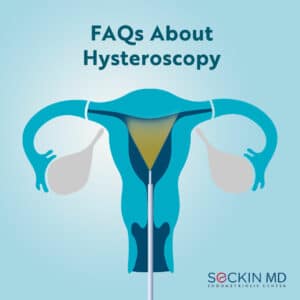FAQs About Hysteroscopy

Hysteroscopy is a technique that can help examine the inside of the uterus or the cervix. During a hysteroscopy, a small scope with a camera enters into the uterus through the natural opening of the uterus, the cervix. Visually examining the inside of the uterus allows for better evaluation of reasons for abnormal uterine bleeding or issues with fertility. Here are some FAQs about this procedure.
When is a hysteroscopy recommended?
Your healthcare provider may recommend a hysteroscopy for the following:
- Evaluating uterine anomalies
- Investigating the cause of abnormal uterine bleeding (fibroids, polyps, for example)
- Evaluating for possible other reasons of infertility or implantation failure and pregnancy losses (adhesions or scar tissue)
- Allowing for directed tissue excision for biopsy
- Removing retained intra-uterine contraceptives
- Treatment of any of the above (removal of fibroids, polyps, retained tissue, or adhesions)
Where does the procedure take place?
Hysteroscopy can take place either in the doctor’s office or in the operating room.
Some diagnostic office hysteroscopy procedures involve local or no anesthesia.
Operative hysteroscopy, on the other hand, requires sedation or general anesthesia as it may involve cervical dilation and interventions for uterine abnormalities such as polyps and fibroids.
What does it involve?
The exact procedure will depend on the condition and the opinion of your healthcare provider. Be sure to ask your doctor to clarify your needs before starting.
In general, you will have to empty your bladder and lie down with your feet in stirrups. Your doctor will insert the hysteroscope into the uterus passing via the cervix and the vagina. They will then infuse a sterile solution to expand the uterine cavity and enable them to look for expected landmarks inside the uterus as well as take images. If necessary for polyp, fibroid, or scar tissue removal, a special instrument will be inserted through the scope.
Can it help diagnose endometriosis?
Hysteroscopy helps in understanding how endometrial cavity changes that lead to the formation of endometriosis lesions.
According to Dr. Seckin, endometriosis surgery should always start with a vaginoscopy and a hysteroscopic evaluation of the endometrial cavity.
When is the best time to have a hysteroscopy?
It is best to perform hysteroscopy immediately after your period and during the early follicular phase. This aids in easy visualization due to a thinner endometrium. Even though the mid-follicular phase is the ideal time to perform it, hysteroscopy can be performed at any time in the cycle.
Are there any reasons I should not have a hysteroscopy?
Your doctor will not perform a hysteroscopy if you are pregnant, have active pelvic inflammatory disease, undiagnosed vaginal discharge or infection, or known cancer of the uterus or cervix.
Are there any risks?
Hysteroscopy is a relatively low-risk procedure. However, in rare cases, complications such as infection, uterine injury, damage to the cervix, fluid or gas absorption, and hemorrhage may occur.
How long will it take me to recover?
Your doctor will guide you on the recovery process, which depends on the complexity of the procedure. You may experience cramping, light bleeding, and vaginal discomfort after the procedure. You should avoid intercourse, douching, or tampoms for one week after the procedure.
Will my periods be delayed?
Menstrual delay may happen if the endometrium (the inner lining of the uterus) is curetted during the procedure.
Can it help me get pregnant?
Hysteroscopic evaluation of the uterine cavity is the gold standard for uterine cavity lesions. Studies have shown that uterine cavity lesions (such as polyps, fibroids, or adhesions) removed via hysteroscopy can greatly increase the chances of getting pregnant.
Did you have a hysteroscopy? Please do not hesitate to share your experience with others if you wish by leaving a comment on our post on Facebook or Instagram.
Get a Second Opinion
Our endometriosis specialists are dedicated to providing patients with expert care. Whether you have been diagnosed or are looking to find a doctor, they are ready to help.Our office is located on 872 Fifth Avenue New York, NY 10065.
You may call us at (646) 960-3080 or have your case reviewed by clicking here.